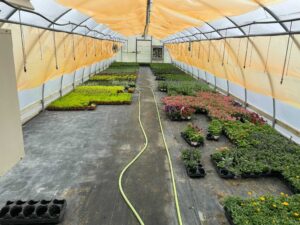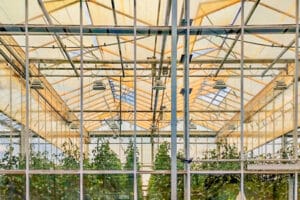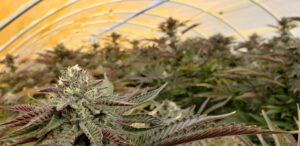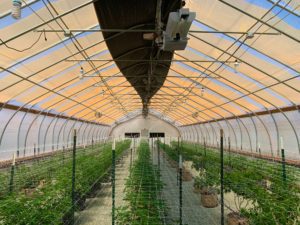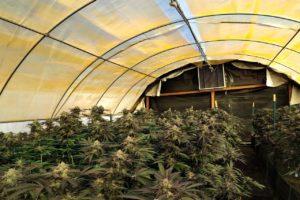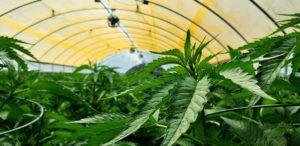+16% Boost in Cannabis Production AT A GLANCE Results Crop Farm Location After ten weeks of cultivation, dry, trimmed harvest weights were reported. Dry yield measurements showed an additional 7.5 lbs of product harvested from plants under UbiGro, equivalent to a +16.0% increase in total dry yield. 248 Hybrid Cannabis Plants with two different strains: Wedding Cake and Ice Cream Cake. Both are broad leaf Indica-dominant hybrids Little Hill Cultivators Over the 4-yr life of the installed UbiGro product, the farm would benefit from $97,500 in additional profit from this 20ft x 108ft greenhouse alone. Trinity Co., CA, USA. DOWNLOAD CASE STUDY PDF ABOUT THE PROJECT UbiGro was installed at Little Hill Cultivators farm in Trinity County, California, to explore innovative cannabis farming solutions aimed at boosting cannabis production. For this pivotal plant trial in cannabis farming, UbiGro was strategically deployed to cover half of a 20ft x 108 ft greenhouse, creating a direct comparison with the other half that remained unchanged and served as the control. This setup was designed to rigorously evaluate the impact of UbiGro on cannabis yield enhancement within the context of cannabis production. The product was expertly mounted above the lateral purlins and beneath the polyethylene cover, ensuring optimal light diffusion and growth conditions for cannabis farming. The trial encompassed a total of 248 cannabis plants, with a focus on two specific strains to assess the versatility and efficacy of UbiGro across different genetic profiles in enhancing cannabis yields. Of these, 194 plants (78%) were of the Wedding Cake strain (Cherry Pie x Girl Scout Cookies), known for its tall stature and larger internodal spacing, coupled with a slightly extended finishing time of 1-2 weeks, indicative of its potential for increased cannabis production. The remaining 54 plants (22%) were of the Ice Cream Cake strain (Gelato x Wedding Cake), another broad-leaf Indica-dominant hybrid, showcasing the application of UbiGro across diverse cannabis strains for enhanced production outcomes. “To me, the product has proven itself.” – Owner, Little Hill Cultivators All conditions were kept identical for both sides of the experiment: plant size uniformity, planting density, strain layout, watering and nutrient regimen, humidity and temperature, harvesting and pruning regimen, integrated pest management regimen, etc. The cultivation team at Little Hill Cultivators made qualitative observations of the crop during the growth cycle. They noted that the plants under the UbiGro product showed an obvious enhanced vegetative growth, exemplified by an increase in height, width and overall foliage, filling more aisle space than their control counterparts. The grower also observed larger, fuller buds on the UbiGro side. After ten weeks of cultivation, dry, trimmed harvest weights were reported. Dry yield measurements showed an additional 7.5 lbs of product harvested from plants under UbiGro, equivalent to a +16.0% increase in total dry yield. No differences in trichome color, finishing time, bud color, bud odor/flavor, or overall quality were observed. After ten weeks of cultivation, dry, trimmed harvest weights were reported. Dry yield measurements showed an additional 7.5 lbs of product harvested from plants under UbiGro, equivalent to a +16.0% increase in total dry yield. No differences in trichome color, finishing time, bud color, bud odor/flavor, or overall quality were observed. Samples of both strains were taken from both sides of the plant trial and were sent to CW Analytical Laboratories (Oakland, CA) for cannabinoid and terpene testing. Total terpene content for the Wedding Cake strain grown under the UbiGro product was improved compared to those grown under the control (+12.9%, relative). Total cannabinoid content was moderately increased for Weddi ng Cake flowers grown under UbiGro (+3.6%, relative). Total terpene content for the Ice Cream Cake strain grown under UbiGro were slightly reduced compared to those grown under the control (-9.1%, relative). Total cannabinoid content was moderately increased for Ice Cream Cake flowers grown under the UbiGro film (+1.9%, relative). Testing accuracy for terpenes and cannabinoids typically has error bars ±10% (relative). Therefore, we conclude that UbiGro had a negligible effect on terpene and cannabinoid content of both strains, except for the +12.9% relative terpene boost in Wedding Cake, which may be a significant result just above the variance threshold. Further trials on the strain would be needed to verify this behavior. Potency Summary: Wedding Cake Terpenes UbiGro: 3.5% Control: 3.1% Rel. Change: +12.9% Total Cannabinoids UbiGro: 23.08% Control: 22.27% Rel. Change: +3.6% Potency Summary: Ice Cream Cake Terpenes UbiGro: 2.0% Control: 2.2% Rel. Change: -9.1% Total Cannabinoids UbiGro: 19.77% Control: 19.40% Rel. Change: +1.9% ECONOMICS OF CANNABIS FARMING Full Season Round (August – November) A yield enhancement in cannabis farming improves the economics of a cannabis production farm, but what is that yield enhancement worth to the cannabis farmer? Taking this experiment as a case study in cannabis yields, we can calculate the value that the yield-boosting UbiGro film brings to the economics of the cannabis farming operation. For this trial in cannabis production, the half of the greenhouse with UbiGro boosted the cannabis yield by 7.5 lbs (+$8.68/ft2 in wholesale revenue) compared to the control in the cannabis farming setting. The farm sells trimmed cannabis for $1250/lb wholesale. If UbiGro had been deployed over the entire greenhouse and achieved the same cannabis yield boost, the farm would have obtained an additional $18,750 in wholesale revenue for that greenhouse in the context of cannabis yields. Since the greenhouse can produce two cannabis crops per year, the yield boost in cannabis production could potentially be realized twice per year, which could result in an increase in revenue from UbiGro of $37,500 per year, per greenhouse in cannabis farming economics. CONCLUSION To quantify the value of the increase in revenue from improving cannabis yields through innovative cannabis farming solutions, we must calculate the increased profit associated with cannabis production enhancements. There are variable costs associated with producing and selling this additional cannabis product, including harvesting, drying/curing, trimming, packaging, and transportation, which are crucial components of efficient cannabis production management. However, fixed costs, which encompass expenses such as real estate (rent/mortgage), heating/cooling, electricity, marketing, and
